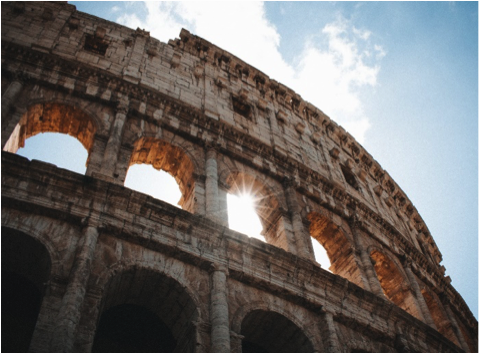By Eric Lee
Populism has eclipsed militarism to be the dominant political force in modern America, echoing the political landscape of the declining Roman Empire, says a UC Santa Barbara Classics scholar.
UC Santa Barbara Classics scholar Noah Segal answers questions from the audience about Late Roman Republic values and youth military service.
“The societal changes of the Late Roman Republic’s aristocratic class has implications for how historians compare the past to our current political landscape,” Noah Segal said in a recent talk to faculty and students of the Classics department.
Segal, who received a BA in Ancient History and Classics at Ohio State University, came to UC Santa Barbara to study Classics as a graduate student with an emphasis on populism in democratic societies. He presented his preliminary findings for the Society of Classical Studies, which hosts leading Classics professors and students who present their current research and arguments. Segal will represent UC Santa Barbara at its international Classics convention in early January.
More American lawmakers are joining Congress today with little to no military service under their belt, he said, which contradicts traditional American values that saw military service as a rite of passage for patriots who dedicate their lives to service to the United States, often leading to politics.
Segal noted that towards the final years of the Roman Empire, aristocrats rejected the notion that lawmakers were required to serve up to 10 years of military service in order to hold public office. Traditionally, most youth spent their time participating in military campaigns. The focus on military experience and military values changed towards the later years of the Republic as aristocrats shifted their focus to more luxurious pursuits, such as learning Greek, drinking fine wines, and finding true love.
The Piazza Del Colosseo, Rome, Italy was the hub of gladiatorial combat for entertainment.
“The argument is that Roman aristocrats in the first century were performing less military service than their ancestors were accustomed to,” said Segal. “This shift in politics represented a greater societal shift that signaled the transformation of the Roman Empire,” he said.
The parallels between modern American politics and the Roman Empire stem from the foundation of Roman values and democratic rule that extend to every facet of American society. As the fall 2018 midterm election results showed, Roman ideals of democratic society are still in play here as the Democrats flipped a staggering 41 House seats from the GOP.
Those who attended Segal’s presentation engaged him with questions, and offered suggestions for his arguments. At the same time, his colleagues expressed their excitement over Segal representing UC Santa Barbara in San Diego at the Society of Classical Studies’s 150th annual convention on January 3rd.
Robert Morstein-Marx, a UCSB Classics professor, congratulated Segal on his paper. “He is a very esteemed graduate student presenting not just his first—but second—paper to be read at the SCS Convention,” Morstein-Marx said. “It’s a big deal.”
Eric Lee is a third-year UC Santa Barbara student majoring in Communication.



